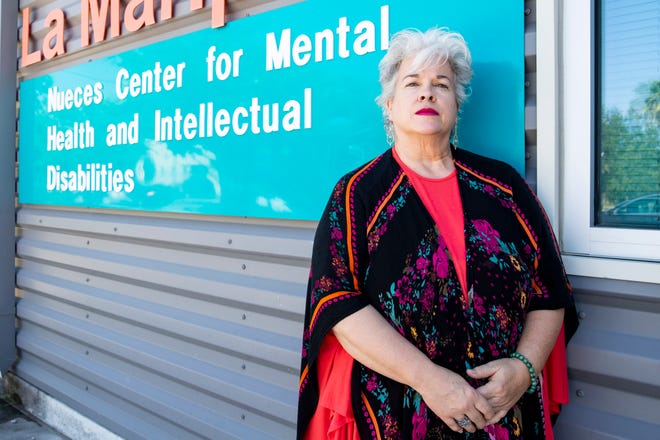
Sandra Scavo developed what she calls a “survival skill.”
For 40 years, the 56-year-old struggled with post-traumatic stress disorder stemming from childhood trauma; she was diagnosed 15 years ago, she said, and began an “intentional healing journey” eight years later.
It gave her the ability to cope with new stress and anxiety brought on by the COVID-19 pandemic, she said. Scavo worked as a family and marriage counselor until 19 years ago; she is now a peer specialist at the Nueces Center for Mental Health and Intellectual Disabilities.
“It’s almost an innate resiliency that is built into somebody that has experienced a lot of trauma or abuse,” Scavo said. “Interestingly enough, during this pandemic, I have even moved to a higher level of self-care. That’s what I need to do in order to push through this.”
The coronavirus pandemic wears on, and so does its toll on people’s mental health as they navigate isolation, stress, anxiety and grief.

Experts expect increases in suicide and substance abuse linked to rising unemployment in Texas during the pandemic — more than 5,000 suicides and 4,700 drug overdose deaths if the jobless rate exceeds 20%. That’s according to recent estimates by Meadows Mental Health Policy Institute, which is conducting a comprehensive mental health study for Nueces County.
Though psychiatric hospitalizations are not expected to increase, the institute says, there may be a need for greater capacity of community services.
Some people may be particularly vulnerable to stress and a sense of lost control during the pandemic, said Linda Fraser, director of clinical services and utilization management for NCMHID. Those include people out of work, those who are homeless and those with marriage or family issues.
But, Fraser pointed out, negative emotions shouldn’t be conflated with mental illness.
“I don’t think there is anybody that is not experiencing some type of negative emotion related to all of this,” Fraser said. “Just because people are experiencing feelings of anger, sadness, disappointment, anxiety, it doesn’t mean that they actually have a mental health issue.”
Local mental health authorities are given resources during or after times of disaster, such as hurricanes, to help their communities cope with negative emotions. But a pandemic is a different type of disaster than a hurricane, Fraser said, as it’s ongoing.
Texas Health and Human Services allocated grant funds for crisis counseling, which includes a COVID-19 Mental Health Support Line. To reach the support line, dial 833-986-1919.
Nueces County residents who call the line may be referred to NCMHID for counseling by phone.
Texas A&M University-Corpus Christi also offers free telehealth counseling for individuals, couples, families and groups. The school’s Counseling and Training Clinic will be closed from July 31 to Aug. 24, but people can call the clinic and complete the intake process during that time. For more information, visit ctc.tamucc.edu or call 361-825-3988.
Fraser and Scavo also offered the following advice to those struggling emotionally:
- Make a list of positives that are coming out of this.
- Limit contact with people who are going to make you more anxious.
- Despite the uncertain future, keep making plans. “People need to have goals to work towards,” Fraser said.
- If you want to avoid the barrage of COVID-19-related commercials on TV, watch movies and shows you’ve seen before that are comforting, and listen to music that brings back positive memories.
- Reflect on other times that were bad in their life and what you did to get through those bad times.
- Take care of your physical health. “It has to start with yourself,” Scavo said. “The more a person can take care of themselves, then you’re emotionally, physically ready to be better and more present in relationships around you. Diet, exercise, all of those things play such a key role.”
- For those who have found themselves with extra time at home, take this time as a gift.
With people’s calendars freed up, Scavo said she has seen friends find creative ways to connect: doing crafts with their kids, posting funny dance videos on social media or simply having conversations.
“I’m seeing so much good come out of this,” Scavo said. “I am seeing a whole new, almost an old-fashioned way of reconnecting because so many of our distractions have been taken away.”
She added that this is an ideal time for self-reflection as people grapple with fear, loneliness and anger. Rather than suppress those feelings or turn to unhealthy coping mechanisms, acknowledge the feelings and reach out for help, she said.
“It is bringing out some of the worst in us, but that’s a good thing,” Scavo said. “We need to just sit with that and see what it is we need to work on.”
It’s important to remember, Fraser said, that what everyone is experiencing is normal — and that it’s essential to have hope.
“Just because you’re feeling this does not mean you’re going to feel like this forever,” Fraser said.
“It’s a rule of unknowns for everybody. If you’re feeling a loss of control, if you’re feeling angry, if you’re feeling sad, if you’re feeling disappointment, that’s the norm. If there’s somebody out there not feeling this, I would be concerned.”
Vicky Camarillo covers education, immigration and other issues in South Texas. See our subscription options and special offers at Caller.com/subscribe.
More:In coronavirus quarantine at TAMU-CC, friends find solace in cooking
More:Spohn, Oceans Healthcare team up to improve Corpus Christi area’s mental health services